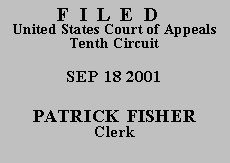

| DARYL DEAN WHITEBIRD,
v.
TWYLA SNIDER, Warden;
OKLAHOMA DEPARTMENT OF
CORRECTIONS; |
No. 01-6107
(D.C. No. 00-CV-409-M) |
Whitebird was tried and convicted of seven offenses: assault and battery with a dangerous weapon, possession of a controlled dangerous substance, felonious possession of a firearm, two counts of pointing a firearm, and two counts of robbery with a dangerous weapon. Based in part on a former felony conviction, Whitebird was sentenced to consecutive sentences totaling 110 years.
The Antiterrorism and Effective Death Penalty Act of 1996 ("AEDPA") sets a one-year period of limitation on all habeas corpus petitions presented by a person in custody pursuant to the judgment of a state court. The period of limitation runs from "the date on which the judgment became final by the conclusion of direct review or the expiration of the time for seeking such review." 28 U.S.C. § 2244(d)(1)(A). We have held that this date is set at the end of the period in which the prisoner could have sought review of the direct appeal of his conviction by the United States Supreme Court. Locke v. Saffle, 237 F.3d 1269, 1273 (10th Cir. 2001). The Supreme Court grants ninety days to parties after entry of judgment to petition for a writ of certiorari. Sup. Ct. R. 13(1).
In Whitebird's case, the AEDPA period of limitation began to run ninety days after the Oklahoma Court of Criminal Appeals affirmed his conviction on September 16, 1997. Thus, the period of limitation for Whitebird's federal habeas claim expired on December 15, 1998. Whitebird's petition for federal habeas relief was filed in February 2000, and therefore is time-barred unless the circumstances warrant equitable tolling of the limitation period.(1)
The AEDPA limitation period "may be subject to equitable tolling" where there are extraordinary circumstances beyond a prisoner's control that make it impossible to file a petition on time. Miller v. Marr, 141 F.3d 976, 978 (10th Cir. 1998). Whitebird argues that the period of limitation should be equitably tolled for two reasons--physical illness, and lack of access to legal resources.
Assuming that a physical illness warrants equitable tolling of AEDPA's limitation period--an issue that this Circuit has not decided, and that we do not reach here--Whitebird has not made any substantial showing of physical illness. In reviewing Whitebird's briefs and supporting materials, the magistrate concluded that Whitebird failed to present sufficient evidence to justify tolling on the basis of illness and noted that Whitebird had presented no evidence that he suffered from any physical incapacity during the one-year AEDPA limitation period. The district court adopted these conclusions in its order. Having reviewed Whitebird's briefs and supporting materials, we agree with the district court's conclusions.(2) Thus, even if we were to accept that physical illness can equitably toll the AEDPA period of limitation, Whitebird has not shown sufficient grounds for tolling.
Whitebird also alleges that the prison facilities where he was incarcerated failed to provide him adequate access to legal resources. The district court accepted the magistrate's conclusion that Whitebird had provided no specificity regarding his alleged lack of access to legal resources, and that his allegations did not warrant equitable tolling. We agree with the district court's conclusions. See Miller, 141 F.3d at 978.
Whitebird further asserts his "actual innocence" as a ground to avoid the AEDPA period of limitation altogether. Actual innocence has been recognized by this Circuit as equitable grounds for not applying the AEDPA period of limitation. Id. The "actual innocence" exception requires a showing that there is new evidence, not present in the trial, that makes it "more likely than not that no reasonable juror" would have convicted the petitioner. Schlup v. Delo, 513 U.S. 298, 327 (1995); see also Sellers v. Ward, 135 F.3d 1333, 1338 (10th Cir. 1998).
The district court concluded that Whitebird's "new evidence" of actual innocence was unconvincing. The new evidence consisted solely of the affidavits of Whitebird himself and of Larry Taylor, who pled guilty to armed robbery based on the same events and who averred that Whitebird was not involved in the robbery in question. Based on these affidavits, the district court concluded there were no grounds for waiving the period of limitations. We agree with the district court's conclusions.
Because there are no grounds for equitably tolling the AEDPA period of limitation, Whitebird's habeas petition is time-barred. His motion to proceed in forma pauperis is GRANTED, his application for a certificate of appealability is DENIED, and this matter is DISMISSED.
The mandate shall issue forthwith.
ENTERED FOR THE COURT
Carlos F. Lucero
Circuit Judge
*. The case is unanimously ordered submitted without oral argument pursuant to Fed. R. App. P. 34(a)(2) and 10th Cir. R. 34.1(G). This order and judgment is not binding precedent, except under the doctrines of law of the case, res judicata, and collateral estoppel. The Court generally disfavors the citation of orders and judgments; nevertheless, an order and judgment may be cited under the terms and conditions of 10th Cir. R. 36.3.
1. While the period of limitation is tolled during the time that a petitioner seeks "post-conviction or other collateral review with respect to the pertinent judgment or claim" in state court, 28 U.S.C. § 2244(d)(2), such tolling only applies if the action for post-conviction relief commences within the one-year limitation period. Whitebird's application for state post-conviction relief was not filed until August 11, 1999, well after the December 15, 1998 expiration of the AEDPA period of limitation. Therefore, no tolling applies.
2. Whitebird's brief on appeal refers to Appendices in Support of Petitioner's Objections to the Magistrate's Report and Recommendation, which he claims include detailed prison medical reports that support his claims of illness. However, the record does not contain these appendices, and we must conclude that Whitebird never filed them. Therefore, we can not consider them in evaluating Whitebird's claims.